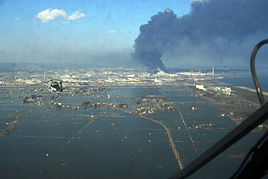English
More than one year has passed since the massive earthquake and tsunami wreaked havoc on the coastal area of the Tohoku region on March 11th last year, triggering the prolonged nuclear disaster. We should not forget that many survivors are still living with the looming fear of exposure to radioactive contamination, as well as being deprived of financial means to survive. Shortly after the disaster, the outpouring of donations and words of grief was sent to the victims from in and outside Japan, promising our solidarity in our efforts to reconstruct Tohoku. But I am afraid our initial determination has been overshadowed by lawmakers’ indecisiveness in taking prompt action. As we commemorate the first anniversary of the Tohoku catastrophe, we should all take time to ponder what we should do as a nation to survive the worst crisis in our nation’s recent history. Unless we transform this tragedy into a turning point in our history, we will do great injustice to the victims of the disaster.
 The administration should prioritize the reconstruction efforts, heeding the slogan of “support Tohoku,” instead of shifting their attention from the immediate work at hand, including the handling of the nuclear debris and helping the survivors get back on their feet. Instead, Prime Minister Noda is willing to stake his political life on the tax hike, which may further hamper Japan’s economic recovery, without even discussing whether it is wise to introduce it in this prolonged deflation. Furthermore, the government has recently announced their intention to reactivate idled nuclear reactors to meet the expected rise in electricity demand this summer before taking adequate measures to ensure their absolute safety. These attempts only make me wonder if the government is downplaying the seriousness of the nuclear disaster and the plight of the survivors. Donald Kean, prominent scholar of Japanese literature, who recently became a naturalized citizen to unite in Japan’s efforts in this nation he loves, expressed his disappointment to find that the nation’s solidarity observed in the aftermath of the disaster no longer exists. So as not to disregard the great many people deprived of their lives or still left missing, we should never forget Tohoku and once again unite in our determination to work as a nation towards turning this calamity into an opportunity for revitalization.
The administration should prioritize the reconstruction efforts, heeding the slogan of “support Tohoku,” instead of shifting their attention from the immediate work at hand, including the handling of the nuclear debris and helping the survivors get back on their feet. Instead, Prime Minister Noda is willing to stake his political life on the tax hike, which may further hamper Japan’s economic recovery, without even discussing whether it is wise to introduce it in this prolonged deflation. Furthermore, the government has recently announced their intention to reactivate idled nuclear reactors to meet the expected rise in electricity demand this summer before taking adequate measures to ensure their absolute safety. These attempts only make me wonder if the government is downplaying the seriousness of the nuclear disaster and the plight of the survivors. Donald Kean, prominent scholar of Japanese literature, who recently became a naturalized citizen to unite in Japan’s efforts in this nation he loves, expressed his disappointment to find that the nation’s solidarity observed in the aftermath of the disaster no longer exists. So as not to disregard the great many people deprived of their lives or still left missing, we should never forget Tohoku and once again unite in our determination to work as a nation towards turning this calamity into an opportunity for revitalization.
日本語
昨年の3月11日、巨大地震が東北沿岸に壊滅的被害をもたらし、長引く放射 能災害を引き起こして以来、一年以上が経った。 私達は、多くの生存者が、いまだ生き ていくための財政手段を奪われているばかりか、放射能 汚染にさらされ るという恐怖に付きまとわれていることを忘れてはいけない。 震災直後、被災 者に向けて多くの寄付や追悼の言葉が日本国内外から寄せられ、我々日本国民としては、東北再建のた めに力を合わせることを誓ったものであった。 しかし、この当初の決意は、政治家の決断力の無さのために有耶無耶になった感がある。東北大震災から1年、私 達はこの国の、近年において最大の危機を 乗り越えるために国家として何をすべきかを皆が考えるべき である。もし、私達が この惨事を 歴史における転換期にしないならば、被災 者 に対して申し訳が立たないであろう。
 政府は、目下の課題から注意をそむけないで、「東北を支えよう」とのス ローガンのもとに 放射性瓦礫の処理や、生存者が自立できるように援助するこ とを含めた災害復旧事業を優先させるべきである。野田首相は この長引くデフレの中で消費税増税を導入することが得策であるか否かを満足 に討論することなしに、日本の経済復興の妨げ になるであろう消費税増税に政治生命を 賭けている。さらに政府は、安全を保障する十分な対策をとら ないで、この夏の電力需要に対 応するために、停止していた原発を再稼働する 意向を表明した。 これらの試みには、政府は原発事故の深刻さと生存者の窮状 を軽んじている のではないかと思わせられる。著名な日本文学の学者で、最近 愛する国日本で共に復興に力を合わせるために日本国籍を所得したというドナルド・ キーン氏は、震災直後に見られた国全体が力を合わせるという態度が今は存 在しないのを見て、残念であると苦言を呈した。 震災で命を奪 われた人々、今 だ行方不明になっている大勢の人々がいるという事実をおざなりにしないために、私達は 決して 東北を忘れてはいけない。そして再び国として、共にこの災難を乗り越えていくことに向けて働く決意を新たにしなくてはいけないのだ。
政府は、目下の課題から注意をそむけないで、「東北を支えよう」とのス ローガンのもとに 放射性瓦礫の処理や、生存者が自立できるように援助するこ とを含めた災害復旧事業を優先させるべきである。野田首相は この長引くデフレの中で消費税増税を導入することが得策であるか否かを満足 に討論することなしに、日本の経済復興の妨げ になるであろう消費税増税に政治生命を 賭けている。さらに政府は、安全を保障する十分な対策をとら ないで、この夏の電力需要に対 応するために、停止していた原発を再稼働する 意向を表明した。 これらの試みには、政府は原発事故の深刻さと生存者の窮状 を軽んじている のではないかと思わせられる。著名な日本文学の学者で、最近 愛する国日本で共に復興に力を合わせるために日本国籍を所得したというドナルド・ キーン氏は、震災直後に見られた国全体が力を合わせるという態度が今は存 在しないのを見て、残念であると苦言を呈した。 震災で命を奪 われた人々、今 だ行方不明になっている大勢の人々がいるという事実をおざなりにしないために、私達は 決して 東北を忘れてはいけない。そして再び国として、共にこの災難を乗り越えていくことに向けて働く決意を新たにしなくてはいけないのだ。


